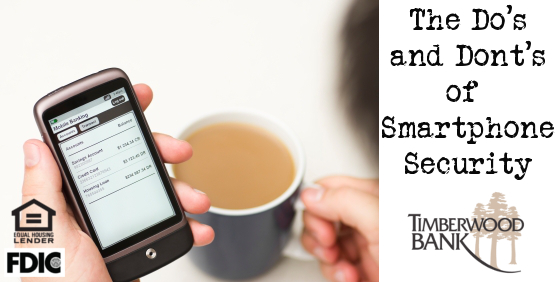Whether we like it or not, Americans and people all across the world are becoming more and more dependent on smartphones every day. With an app for just about anything you could ever need, from online banking and to shopping, smartphones are here to stay.
For many folks, with the ease of smartphone use brings the fear of smartphone security. Many companies build in multiple security features with their online services and apps, but there are a few things you can do to protect yourself from smartphone criminals as well.
Do’s and Don’ts of Smartphone Security:
- Do set PINs and passwords- take advantage of your security setting that allows you to set up a passcode. You should also enable any settings that lock your phone after a certain period of idle time.
- Do backup and secure all data- whether it’s to your computer, the cloud(if you understand how it works!) or an external hard drive, be sure to backup all of your data in the event you lose your phone or it is stolen.
- Don’t buy or download questionable apps- read reviews and confirm that the app is legitimate before downloading. Criminals can create apps that contain malware to steal information, plant viruses and cause harm to your phone.
- Do understand app permissions- many apps may request access to your privacy settings to get your location or to send you notifications. Be sure you know full well what each app is doing, and change the apps security settings to what you feel most comfortable with.
- Don’t ignore your phones software updates- this ensures security patches are in in place to cover any spots that could be vulnerable.
- Do look for apps that allow wiping and remote location- such as Find my iPhone, these apps allow you to either completely wipe data from your smartphone if it is stolen, or locate your phone if you lost it.
- Don’t always be checking to use public Wi-Fi- use public Wi-Fi as little as possible. When you do, be wary of doing tasks that require personal information, such as logging in to Online Banking or submitting applications.
While these aren’t “fail-safes,” the above items will reduce the chances of your smartphone being compromised. When it comes down to it, if you aren’t sure if you should download or do something unfamiliar with your smartphone, don’t do it! Here at Timberwood Bank, we are always ready to provide you with more information regarding online and mobile banking security.
Timberwood Bank
Member FDIC
Equal Housing Lender


